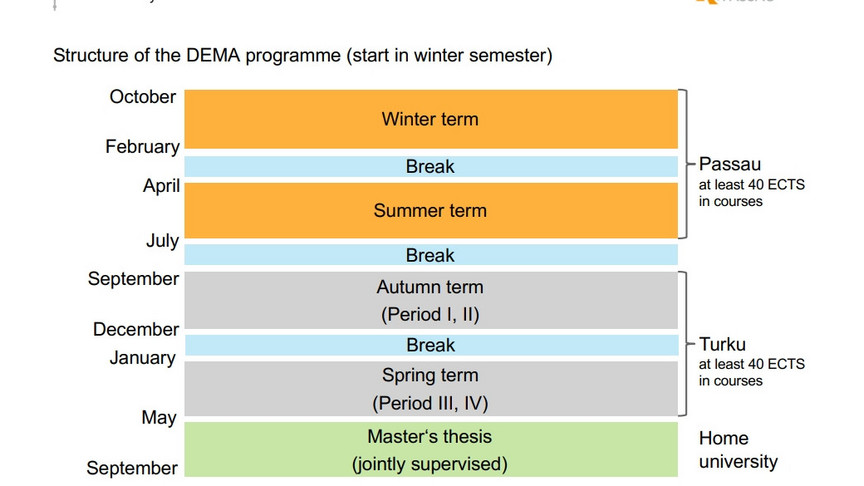Double Master Degree in Digital Enterprise Management (DEMA) / Information Systems
| Quick Facts | Details |
|---|---|
| Programme | Digital Enterprise Management (DEMA) / Information Systems |
| Partner Universities | University of Passau, Germany and University of Turku, Finland |
| Degree awarded | Master of Science in Information Systems (University of Passau, Germany) and Master of Science (University of Turku, Finland) |
| Duration and credits | 4 semesters; 120 ECTS credits Start winter semester in Passau: October – July; in Turku: September - May Start summer semester in Passau: April - July; in Turku: September - May; in Passau: October - February (for Passau students) |
| Application deadline | Jun 15th (next winter semester for Passau students) Jan 15th (next winter semester for Turku students) Jan 15th (next summer semester for Passau students) |
| Starts in | October (winter semester) or in April (summer semester) |
| Language of instruction | English |
Profile of the programme
The University of Turku, Turku School of Economics and the University of Passau, Department of Business Administration and Economics coordinate their Master’s degree programmes in Information Systems in order to enable outstanding students to obtain a degree from each institution.
The programme focuses on topics in Digital Enterprise Management (DEMA), which is comprised by two modules:
- The Networked Business & Digital Ecosystems module focuses on economic and technical aspects of today’s networked and digital business environment. Students learn about digitally enabled organizations, and how they benefit from advanced data management and digitalized, networked business platforms to improve performance of networked business ecosystems. Moreover, they learn about economic and technical aspects of digital ecosystems as well as information and communication technologies.
- The IT Management module focuses on the design, delivery, and implementation of IT services, applications and infrastructure to align business needs and IT security requirements in networked organizations. Special attention is paid to the management of complexity of IT-assets and networked business by means of enterprise architecture management and governance. The students learn to define IS services to support business processes and knowledge sharing, and to manage multi-party implementation projects. Students also develop their ability to understand the significance of business networks for software industry as well as methods to address ethical and responsibility issues related global businesses.
The programme offers a great opportunity for excellent students to develop a unique and outstanding academic profile, as it combines the strengths of two distinguished Master’s programmes at the University of Turku (focusing on IT-Management) and the University of Passau (focusing on Networked Business & Digital Ecosystems), respectively.
The Digital Enterprise Management (DEMA) double-degree programme is designed for students who want to pursue an international career at the interface of IT, business and management. Graduates’ expertise will be key for translating strategic and operational needs into better information systems for enterprises and networked businesses. In short, graduates learn how to strategically apply IT to analyse design and support business change and transformation and thus enable a company to achieve its strategic, tactical, and operational goals. Upon completion of the DEMA programme the student is able to (learning objectives):
- understand and implement modern Internet-based technologies
- understand the information systems complex in private and public organizations
- understand the role of IS in networked organizations and in digitalization
- understand the opportunities of IS in small and medium enterprises, and their role in networked business
- implement information systems and changes of operations in organizations and business networks
- manage the information resources and make grounded and sound decisions improving profitability of business
- identify methods for the analysis and transformation of business processes to facilitate better and sustainable performance improvement of digitalization.
The double degree programme is offered for excellent students with a focus on Information Systems that are already enrolled in one of the following programmes:
- At the University of Passau for students in Masterstudiengang Wirtschaftsinformatik (M.Sc. lnformation Systems) or Masterstudiengang Business Administration (M.Sc. in Business Administration and majoring in lnformation Systems) programmes.
- At the University of Turku for students in Master of Science (majoring in lnformation Systems) and the Master of Science in Economics and Business Administration (majoring in lnformation Systems).
The students, who successfully completed the double degree study programme will receive a Master’s degree from each partner institution. The delivered diplomas include at least a transcript of records.
The degrees that double degree students will receive from the partner university, in addition to the degree of their home university, are, respectively:
- University of Passau:
Master of Science in Wirtschaftsinformatik (lnformation Systems) from the Faculty of Business Administration and Economics. - University of Turku:
Master of Science from the Turku School of Economics, Master's Degree Programme in Global IT Management, Digital Enterprise Management with a major in Information Systems Science.

The programme is organized such that students pursue the course programme in their first academic year (winter and summer semester: October – July) at the University of Passau with a focus on networked business and digital ecosystems. Subsequently, students pursue their second academic year (periods I-IV: September – May) at the University of Turku with a focus on IT-Management. Thus, German and Finnish students from the same cohort will pursue the programme together during the entire duration of the course programme. After completion of the course programme, students will write their master’s thesis at their respective home university.
For Passau students there is also the possibility to start the programme in a summer semester (April - July) at the University of Passau. Then students continue the programme at the University of Turku (periods I-IV: September - May) and after this they pursue at the University of Passau by writing their master’s thesis. Afterwards students study another semester (October - February) at the University of Passau to complete the course programme.
Structure of the programme (start in summer semester for Passau students)
In total at least 40 ECTS in courses (NOT including seminar and master’s thesis) have to be taken at each partner university.
Students will have to fulfil individually the requirements of each university’s master’s programme (120 ECTS each) in order to be awarded the double degree. Generally, courses taken at either university will count towards both degree programmes. To ensure eligibility of courses and a coherent study programme, students have to devise a study plan (see below for more information), which must be approved by the Board of the double-degree programme.
Masters’ thesis and seminar will be jointly supervised by academic partners at both universities, but each must be written at the home university. Both, seminar and masters’ thesis need to be written in English.
Structure of the programme (start in winter semester)
For a start in the next winter semester, the application deadline for students of the University of Passau is June 15th every year. Acceptance decisions will be devised already by June 30th.
For a start in the next winter semester, the application deadline for students of the University of Turku is January 15th every year. Acceptance decisions will be devised as soon as possible, due to the fact, that the application deadline for the ERASMUS+ programme is February 1st.
For a start in the summer semester, the application deadline for students of the University of Passau is January 15th every year. Acceptance decisions will be devised as soon as possible, due to the fact, that the application deadline for the ERASMUS+ programme is February 1st.
A maximum of 10 students per cohort will enter the double degree programme according to the inter-institutional agreement 2016-21 within the ERASMUS+ programme.
For students of the University of Passau
Start programme in the winter term: Students who want to start the programme in October have to apply in June. Please note that students at the University of Passau must independently (and likely before Jun 30th) also apply for enrollment in an eligible Master’s degree programme. Acceptance to the double degree programme is made conditional on the acceptance to the University’s regular Master’s degree programme. The current application deadlines for the winter semester at the University of Passau can be found here. If accepted, the programme starts for these students with the first two semesters (winter and summer) in Passau.
Start progamme in the summer term: Passau students who want to start the programme in April have to apply at the end of the previous semester. They start with the first semester in Passau and end, after writing their Master’s thesis, with one last semester in Passau. Please note that students at the University of Passau must independently (and likely before Jan 15th) also apply for enrollment in an eligible Master’s degree programme. Acceptance to the double degree programme is made conditional on the acceptance to the University’s regular Master’s degree programme. The current application deadlines for the summer semester at the University of Passau can be found here.
For students of the University of Turku
Students who are enrolled in a Bachelor’s programme with a focus in Information Systems at the Turku School of Economics are requested to apply to the programme during their last year of the Bachelor’s degree. They are accepted to the programme conditional on completing their Bachelor’s degree by the end of the spring term. If accepted, students from Turku, start the double-degree programme at the University of Passau in October of the year following their application.
Requested documents for application
Applicants need to provide the following documents when applying for the double degree programme:
- A motivation letter (max. 1 page)
- Curriculum vitae
- A printed copy of the completed and signed application form (Word document)
- A copy of a valid passport
- A certified copy (with the official stamp of the school) of the Bachelor's degree, including a transcript of records/list of grades (in English). Alternatively, students can submit an up to date transcript of records and a certificate of their academic supervisor that they are in good standing. They are then accepted conditionally on completing their Bachelors’ degree before entering the double degree programme.
- Certificate of enrolment at their home university.
- Copy of High School Diploma/Abiturzeugnis (A-levels)
- Proof of English language proficiency: TOEFL or equivalent, at least B2 level (Confirmation in the High School Diploma/Abiturzeugnis is sufficient)
- Complete study plan (see Study Plan below for more information), specifying the courses to be taken during the double degree programme at each partner university.
All application documents should be combined into a single PDF file and submitted electronically to the Board of the double degree programme via email to turku-passau-exchange@uni-passau.de.
The study plan is a central element of the double-degree programme and each student’s application. It requires the student to derive a course plan early on, which not only ensures academic rigor and coherence, but also that the selected lectures are likely to be offered in the relevant time frame.
In the following, we provide more information on how to devise the study plan.
- The study plan does not demand students to pick any particular course, but rather demands students to select a personal study plan such that the learning objectives detailed in “Profile of the Programme” are met.
Students need to fulfil the degree requirements at each university. In particular, they have to select a certain amount of courses in a given study area for each degree program. As students should be familiar with the requirements of the degree program at their home university, we briefly describe the requirements for each group of students at the hosting university here:
For students coming from the University of Passau:
Above and beyond the degree requirements at the University of Passau, students are required to take 80 ECTS in the study area „Information Systems“ to obtain a degree at the University of Turku. This includes the jointly supervised master’s thesis and seminar, which are awarded a total of 30 ECTS in the Turku degree program. Generally, courses taken in the study area „Information Systems“ at the University of Passau are also eligible for the study area „Information Systems“ at the University of Turku. In addition, Passau students must complete 40 ECTS of "Optional Studies" for the Turku degree program. This courses can be "Information Systems" courses or from the study area "Methods" and "Business Administration and Economics" or based on personal study interest. Here you will find helpful information about the Master's program, especially a list with current courses and assignments in the Information Systems Department: https://www.winfo.uni-passau.de/faq-masterstudiumFor students coming from the University of Turku:
Above and beyond the degree requirements at the University of Turku, students are required to complete at least 10 ECTS in the study area „Methods“, 18 ECTS in the study area „Business Administration and Economics“ and 65 ECTS in the study area „Information Systems“ (NOT including master’s thesis or seminar) to obtain a degree at the University of Passau. From the 65 ECTS in „Information Systems“, up to 15 ECTS can be replaced by courses in „Interdisciplinary Specialization“ courses, which can include, e.g., courses in computer science or law. The jointly supervised master’s and seminar thesis (or master’s thesis with integrated seminar) will be credited a total of 27 ECTS in the Passau degree program. Here you will find helpful information about the Master's program, especially a list with current courses and assignments in the Information Systems Department: https://www.winfo.uni-passau.de/en/faq-masters-program
- Individual courses eligible to be selected as part of their study plan are listed in the module catalogue (only in German) for the University of Passau and in the study guide for DEMA students from the University of Passau and in the study guide for DEMA students from the University of Turku for the University of Turku, School of Economics. Both lists include, for each course, learning goals of the courses, which should be matched to the overreaching learning goals specified.
- Some courses may have restricted access and may thus not be eligible for students in the double degree program (e.g., some courses at the Turku Law School or courses in International Business, which are restricted to degree students in University of Turku School of Economics), or may have limited capacity. Restrictions are usually listed at the end of the published module catalogue and/or can be inquired from the responsible lecturer. Students are responsible to checking the prerequisites for the admission to each course in advance.
- In total at least 40 ECTS in courses (NOT including seminar and master’s thesis) have to be taken at each partner university.
- At both institutions only master’s level courses are eligible for the double degree program.
- At least one of the courses in the area "Business Administration and Economics" needs to be taken at the respective home university.
- "Information Systems" courses at the University of Turku must be taken as "Information Systems" courses in Passau. They cannot be credited in the study area of "Business Administration and Economics".
- Please note that the following course combinations entail a significant amount of overlap between the courses, which may therefore not be selected together in the study plan. It is, of course, possible to select just one of the courses from each combination:
a) Management of IT Architectures / IT-Achitekturmanagement (Passau) <> Enterprise Architecture (Turku)
b) IT Services and Management of IT Services / IT-Services und IT-Servicemanagement (Passau) <> Management of ICT Services (Turku)
c) Theorieentwicklung und Forschungsmethoden in der Wirtschaftsinformatik (Passau) <> Research Methods (Turku) - Masters’ thesis and seminar will be jointly supervised, but each must be written at the home university. At the University of Passau, the seminar and Master’s thesis are separate courses, but at the University of Turku the seminar is integrated with the Master’s thesis. Both, seminar and masters’ thesis need to be written in English. The combination of seminar and Master’s thesis will count 27 ECTS towards the degree programme of the University of Passau and 30 ECTS towards the degree programme of the University of Turku.
- Students apply with a preliminary version of their study plan that, after the application was successful, needs to be formally approved by the Board. Once approved, the courses in the study plan become mandatory for the students, unless there is a good reason to change (e.g, discontinuity of a course). The Board needs to approve changes. At the same time, the Universities try to offer the courses specified in the study plans, such that students can actually pursue the plan. The study plan does not imply a right to be admitted to the particular courses listed in the study plan.
- A study plan is only approved if it is signed by the professors of the board. This document will substitute a Learning Agreement, i.e., it will serve as a commitment to the student to accept the courses passed at the foreign university at the home university. At each university, the courses will be accepted with their original ECTS. In reverse, there is no commitment for the home university to accept courses taken at the foreign university that are not listed in the study plan.
To facilitate the compilation of the study plan, please use the following template.
Unless English is your first language or the language of instruction for your undergraduate studies or secondary school education, you will need to prove that you have adequate English skills (level B2 CEFR or higher) by means of a recognised language certificate.
Students will pay tuition and admission or registration fees to their home institution according to the local rules. Within the ERASMUS+ programme students are exempt from paying fees at the partner university. This does not apply for students from Non-EU-countries, for details see: https://www.utu.fi/en/study-at-utu/scholarships-and-tuition-fees.















